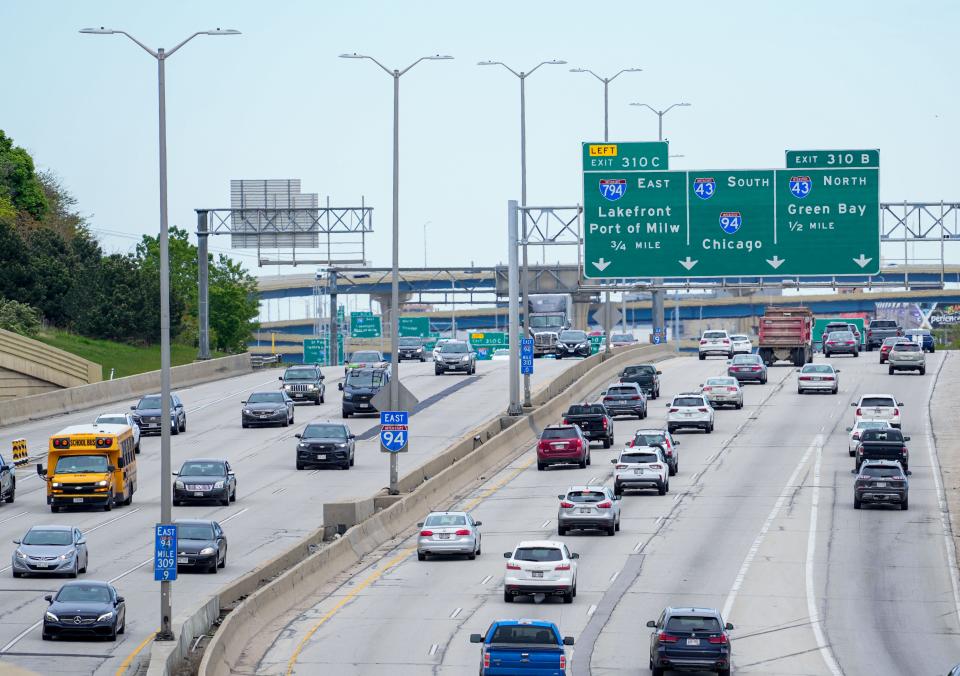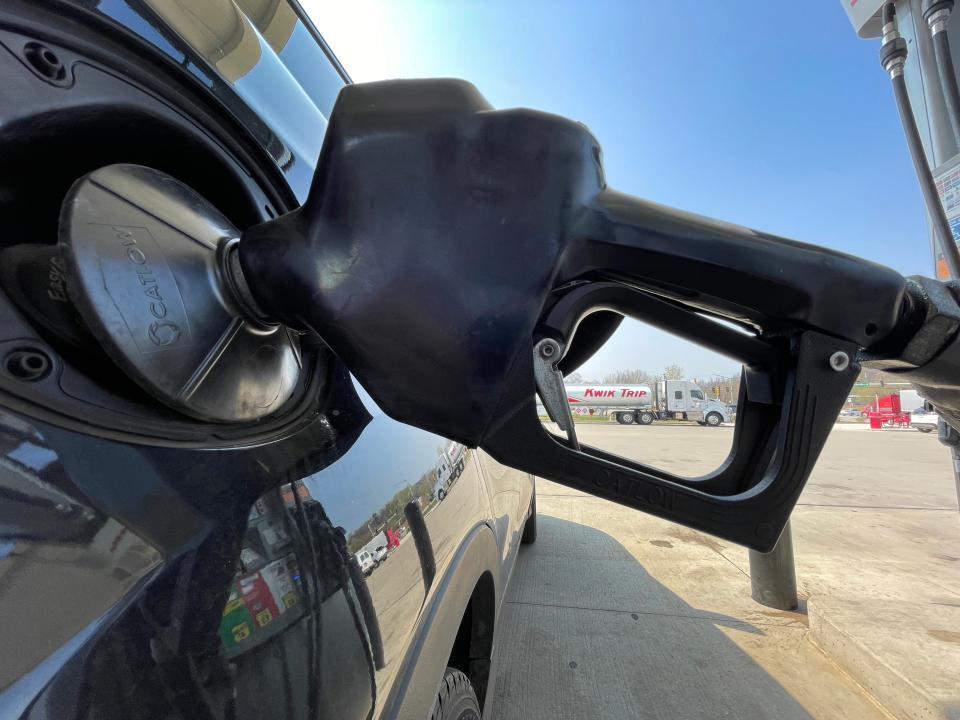Despite record-high gas prices, people are tired of being cooped up and are expected to hit the road for Memorial Day weekend

Despite the highest gas prices ever in Wisconsin and the U.S., millions of travelers will hit the road this Memorial Day weekend, travel forecasters say.
Travel organization AAA is predicting that 741,000 Wisconsin residents will travel 50 miles or more this Memorial Day weekend. That's a 7.4% increase over 2021.
Nationally, more than 39.2 million Americans will travel for the holiday weekend. That's an 8.3% increase from 2021.
Among travelers this weekend, 90% of them will be driving to their destination, AAA said.
The travel forecast comes as the national average for a gallon of regular gasoline stood at $4.60 on Monday. A year ago, the national average was $3.04 a gallon.
The Wisconsin average was $4.31, a penny below the highest price ever, which was recorded May 19. A year ago, the price in Wisconsin was $2.86.
The price of gasoline in the U.S. has either remained flat or risen every day since April 24 and has set a new record high every day since May 10, according to the AAA Daily Fuel Gauge report.
The highest average price for regular gasoline was in California at $6.07 a gallon. The lowest was in Oklahoma, at $4.04 a gallon.
As of Monday, all 50 states were above $4 per gallon, according to AAA.
More: 5 last-minute getaways for Memorial Day weekend, from Madison to Lake Geneva
“Record-high gas prices aren’t scaring away as many avid road trippers this Memorial Day as one would think,” said Jenni Newman, editor-in-chief of car shopping website Cars.com. “It seems many Americans are willing to pay a premium to take some time off and celebrate the holiday."
In a survey, Cars.com found that carpooling is no longer just for work and school commutes, amid soaring gas prices.
"Eighty-seven percent of consumers surveyed by Cars.com say they will be traveling with others this holiday weekend," the car-shopping website said in a statement. Of those who said they are traveling with others, 51% said high gas prices are one of the reasons.
We're tired of being cooped up
Travel during the long Memorial Day weekend is expected to be the busiest in three years, according to AAA.
"This year’s forecast marks the second-highest single-year increase in travelers since 2010," AAA said in a statement. The biggest increase was in 2021 when the nation was rebounding from COVID-19 lockdowns.
Travel volumes for this year are forecast to be near pre-pandemic levels.
The increase looks to be across all modes of travel.
“People are more comfortable traveling now than any other time in the past two years, and travel bookings are a reflection of that, said Debbie Haas, vice president of travel for AAA – The Auto Club Group. "Reservations for flights, hotels and cruises for Memorial Day weekend are twice as strong as last year’s holiday ..."
Whether that momentum carries into the remainder of the year remains to be seen.
When asked about inflation’s effects on travel plans, 70% of respondents in a survey published by GasBuddy said their summer travel plans have been affected by high gas prices.
"More than a third indicated that high inflation has made planning more difficult, and the majority (65%) are taking only one or two road trips," GasBuddy said in a statement.
"Against a backdrop of gas prices that have continued to set new records ahead of Memorial Day, Americans have been resilient in their desire to hit the road, but we're certainly seeing increased hesitancy due to rising prices at the pump," said Patrick De Haan, head of petroleum analysis for GasBuddy.
“The COVID factor is still present but has been dwarfed this year by Americans’ concern over high gas prices and dwindling affordable travel options ...,” De Haan added.
Memorial Day Weekend will be the most popular travel weekend followed by Independence Day, which falls on a Monday this year, and Labor Day, according to the GasBuddy survey.
Gas prices add to inflation pressure
Rising costs for just about everything are taking up more of the family budget and raising alarms that American consumers will have to shift their discretionary spending into spending for necessities like gasoline and food.
That inflationary pressure is also leading to concerns that a recession is coming in the U.S.
A series of disappointing earnings reports from key retailers — including Walmart, Target and Kohl's — last week has been raising concern that consumers are tempering spending on a wide range of goods as they get squeezed by rising inflation.
Lingering concerns about inflation have been weighing on the market and have kept major indexes in a slump. The benchmark S&P 500 is so far experiencing its longest weekly losing streak since the dot-com bubble was deflating in 2001.
It came close to falling 20% from its peak earlier this year, which would put the index at the heart of most workers’ 401(k) accounts into a bear market.
Inflation’s impact on consumers and businesses has been a key worry for markets. The resulting declines have done nothing to inspire consumer confidence in the health of the U.S. economy.
We're still going to hit the road.
“Coming out of this two-year pandemic, Wisconsinites are eager to travel again, and it doesn’t seem like record-high gas prices or other inflationary pressures will stop them,” said Nick Jarmusz, director of public affairs for AAA. “Many may look at cost-cutting measures to offset the added expense, like driving shorter distances, staying in a less-expensive hotel or spending less on shopping, dining and entertainment.”
Here are tips for saving on gasoline
The U.S. government offers tips for saving gas at the fueleconomy.gov website.
In years past, the tips might have added up to a few cents per gallon savings. But as gas prices have skyrocketed past $4, some of the tips can result in serious savings.
Slowing down saves gasoline. Aggressive driving — speeding, rapid acceleration and rapid braking — wastes gas. It can lower your gas mileage by roughly 15% to 30% at highway speeds and 10% to 40% in stop-and-go traffic.

Try to combine trips. Fuel economy is worse when your engine is cold than when it is warm. Several short trips taken from a cold start each time can use twice as much fuel as a longer, multipurpose trip covering the same distance.
We don't like to drive slow, but ... Each vehicle reaches its optimal fuel economy at a different speed or range of speeds. As a general rule, gas mileage usually decreases rapidly at speeds above 50 mph.
More: Here's how to check how much your car could save by slowing down
"Speeding increases fuel consumption and decreases fuel economy as a result of tire rolling resistance and air resistance," according to the U.S. Department of Energy.
Still, no one should drive 50 mph in a 70 mph zone on an interstate highway. That would be dangerous. Still, if your practice is to drive 5 or 10 mph over the speed limit, you could save some money by slowing down.
"Reducing highway speeds by 5 to 10 mph can increase fuel economy by as much as 14%, according to AAA.
Plus, driving the speed limit all but eliminates your chances of getting a costly speeding ticket. Each year, about 40 million Americans are ticketed for speeding.
If you're from Chicago, wait to fill up in Wisconsin. Average price for a gallon of regular in the Chicago metro area was $5.20on Monday. If you can make it to Kenosha, you'd find the price at $4.54 a gallon, for a cool 66 cents a gallon saving. Let's say you're filling up a Toyota RAV4. With a 14.5 gallon tank, you've saved nearly $10 by filling up in Wisconsin.
Avoid rooftop cargo. Hauling cargo on your vehicle's roof increases aerodynamic drag (wind resistance) and lowers fuel economy. A large, blunt roof-top cargo box, for example, can reduce fuel economy by around 2% to 8% in city driving, 6% to 17% on the highway, and 10% to 25% at interstate speeds. Rear-mount cargo boxes or trays reduce fuel economy by much less — only 1% or 2% in city driving and 1% to 5% on the highway.
Don't let the car idle. This one seems like a no-brainer. Idling can use a quarter- to a half-gallon of fuel per hour. Your vehicle is burning gasoline but going nowhere. That means you're getting 0 mpg.
"A warm engine only takes around 10 seconds worth of fuel to restart. Where safe to do so, shut off your engine if you will be stopped for more than a minute," according to AAA.
Put the vehicle on cruise. Using cruise control on the highway helps maintain a constant speed and, in most cases, will save gas.
What about the air conditioning? Running the car's air conditioner is the main contributor to reduced fuel economy in hot weather. "Under very hot conditions, AC use can reduce a conventional vehicle's fuel economy by more than 25%, particularly on short trips," according to fueleconomy.gov. Here's what is recommended:
Roll the windows down at lower speeds; use the AC at highway speeds. Don't use the AC more than needed or set the temperature lower than needed.
Drive with the windows open for a short time before using the AC. Letting hot air out of the cabin first will put less demand on the AC and help your vehicle cool faster.
Don't idle with the AC running before driving. Turn the AC on after you begin to drive or after airing out the cabin briefly. Most AC systems will cool the vehicle faster while driving.
Here are some other tips from Nerd Wallet.
If you drive, you should shop around. "Use an app like GasBuddy or map your route on Google Maps or Waze to see gas prices at nearby stations,'' Sara Rathner, personal finance expert at NerdWallet, told USA TODAY.
Tap into loyalty programs. Fuel programs might trim your bill by a few cents a gallon. And check with the loyalty program at your grocery store to see if you can earn points to pare the price of gas.
Pick 'n Save and Metro Market stores offer fuel discounts to customers in a program with BP.
Festival Foods on Tuesday announced a fuel rewards program with Kwik Trip. The program begins on Wednesday.
Consider your credit card. A cash-back card may allow motorists to get 2% or more cash back when you buy gas.
Tips from a former Packer who is a Driver
The annual "Click It or Ticket" enforcement campaign has begun, and former Green Bay Packer Donald Driver is featured in a state Department of Transportation video campaign to encourage seat belt use
The campaign runs through June 5.
"Law enforcement agencies will step up enforcement for drivers and passengers who are not wearing their seat belts," according to the Wisconsin DOT. "Buckling up is one of the quickest and easiest steps you can take to survive a crash."
Unbelted drivers and passengers make up half of those involved in deadly crashes in Wisconsin, according to the Transportation Department.
“We are seeing a rise in deadly crashes across the country," said Anthony Burrell, superintendent of the Wisconsin State Patrol, in a statement. "Click It or Ticket is a critical awareness campaign to remind every Wisconsinite why it’s so important to always buckle up.”

Wisconsin’s seat belt use is dropping. A seat belt survey found about 88% of Wisconsin drivers and passengers buckled up in 2021. That number was down 2 percentage points from 2019 and lags behind the national rate of about 90%.
Meanwhile, former Packers star Donald Driver appears in a new animated video to encourage seat belt use.
Wisconsin’s seat belt law allows law enforcement to stop and cite drivers for not wearing a seat belt. Drivers can also be cited for unbuckled passengers in their vehicle.
The goal is to encourage a long-term change in driver and passenger behavior.
“Our goal with Click It or Ticket is to save lives, not just hand out tickets. Ultimately, we would rather write a warning or citation than make a death notification,” Burrell said. “Every time we talk about the importance of using a seat belt, we have a chance to save a life.
"Buckle your seat belt. Every trip, every time.”
THANK YOU: Subscribers' support makes this work possible. Help us share the knowledge by buying a gift subscription.
DOWNLOAD THE APP: Get the latest news, sports and more
Contact Joe Taschler at (414) 224-2554 or jtaschler@gannett.com. Follow him on Twitter at @JoeTaschler or Facebook at facebook.com/joe.taschler.1.
This article originally appeared on Milwaukee Journal Sentinel: Gas prices are at record highs as heavy Memorial Day travel expected
